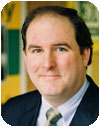 |
|
|
While Conservative leader Stephen Harper continues to predict a majority Tory government come June 28th, and as pundits speculate
as to who in the Tory caucus might be appointed to cabinet posts in a Conservative government, the polls still show that this election is a dead heat, and that neither the Liberals nor the Conservatives are poised to form a majority government in 11 short days.
VanRamblings agrees with CTV’s Tom Clark when he reported on CTV News tonight that “for a leader who campaigns against Liberal arrogance this sort of talk (Harper’s assertion that he will form a majority government) may be risky. The last time that Stephen Harper talked openly about a majority government, he got his knuckles rapped by his own advisors. ‘Too arrogant’, they said. Well, it still may be, especially if the next set of polls don’t reflect a Tory majority, because failing to meet expectations could take a lot of steam out of (the Conservative party’s perceived) momentum.”
Counting votes before they’ve been cast must be seen as the first major misstep by Harper in an otherwise pristine campaign for government. How will Canadians react to Harper’s arrogant assumption of a majority Conservative government. VanRamblings is willing to wager: not well.
Harper’s Numbers Don’t Add Up
You’d think it would make eminent sense to Canadians when Prime Minister Martin stated in the debates the other night that a Tory government couldn’t possibly cut taxes and spend $90 billion on health care and re-arming the military, and not somehow have to make fundamental cuts to social programmes, or take Canada into the kind of reeling debt and deficit of the last era of Tory government. So far, though, it’s not a message that’s resonated with Canadians.
Is the desire of Canadians for change so great that we’re willing to give the Tories a blank chequebook, and damn the consequences to the economy?
“To say we can deliver more tax cuts and still meet our obligations (such as pensions and health care), other programmes inevitably will have to be cut back substantially,” Warren Jestin, chief economist with Scotiabank, said in an interview with the Toronto Star today … “I get very concerned . . . we’ve seen it before when there are big tax and spending promises — inevitably, something has to give.”
A similar message came in new Liberal TV ads (not available on the web as of this writing) that warn voters that Harper’s plans will produce the kinds of deficits recorded under former Ontario Mike Harris and former Tory Prime Minister Brian Mulroney (for good measure, he should have thrown in the name of British Columbia premier Gordon Campbell, as well).
A second study conducted by the C.D. Howe Institute, a non-partisan think-tank, also critiqued the Conservative tax proposal, saying that Canadians should debate the choices they must make between health spending and tax cuts.
“For Canada to maintain the same system with lower taxes, Ottawa would have to reduce spending in other areas, and the choices would not be easy,” said the report co-authored by Jack Mintz, a noted tax expert. “It would certainly be hard to cut taxes and spend more on health care if … efficiencies in public services cannot be achieved.”
Conservatives insist that Harper’s $58-billion election platform can be achieved without cuts to programmes by trimming fat. Yet Harper’s plan has raised many eyebrows among private-sector economists. Last week some warned that Harper can achieve his goals only by reducing spending — which some analysts favour — or risk deficits.
Why Social Issues Create Tensions In Tory Ranks
Frances Bula, writing in today’s Vancouver Sun interviewed a number of British Columbia political analysts about why the Conservatives are so vulnerable on social issues, an area where the Conservative party is potentially most out of sync with the majority of Canadians. The Conservatives’ social agenda has also been the source of most of the tension within the party between the members of the old Alliance and the old Progressive Conservative party.
David Laycock, of Simon Fraser University, and Reg Whitaker, a University of Victoria professor, told Bula that this gap and this tension have led to certain tactical and strategic moves on the part of Stephen Harper. In particular, his attempt to quell dissent within the party ranks and keep social issues off the agenda: “They understand you can’t elect a right-wing party in Canada with a socially conservative agenda at the forefront.”
Yet, that’s what we’re gonna get come June 28th — a socially regressive government out of step with the wishes of most Canadians. And why is it, that a substantial number of Canadians are planning to vote for the Tories?
